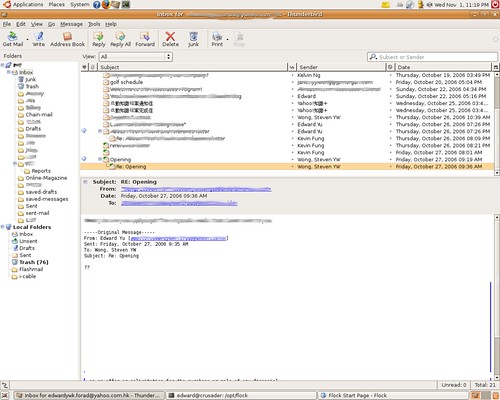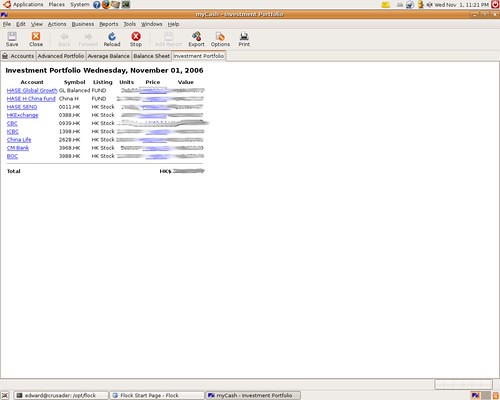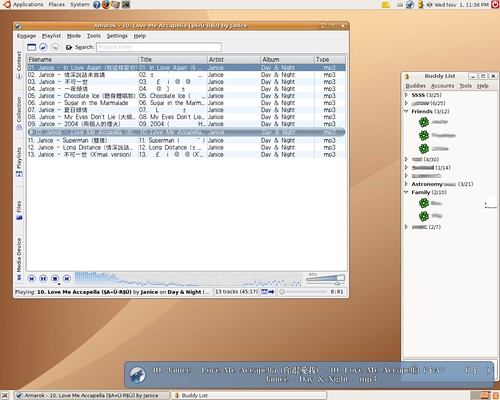Contains technical document about Unix/Linux, Java, Python, Raspberry Pi and other IT related topics. Not a full tutorial but as a quick reference guide
Friday, November 17, 2006
Using FON to access Internet around the world
Actually FON is not really a ISP, but it asks the community to share their network connection with a special wireless router to FON's members such that the members can access Internet using the shared wireless access points. Please note that members can access Internet once they detect there is a FON access point nearby, no matter you are in Asia, America, Europe, Africa or even Antarctica (Only if there is really an access point)!
Is the service free? Yes and no, it depends on how you share your network. Please have a look at the official site and the plans. But what shocks me is that how this model will upset the traditional ISP. I can even imagine we can use a WiFi PDA or smartphone to access FON network, then use VoIP software such as Skype to make cheap call, instead of using IDD or roaming services when we go traveling.
Now the critical point is the number of people who are willing to share the network. If there are enough people, the FON will be a great success business model, make the people get closer and closer.
Ref: http://www.fon.com (official) http://hk.fon.com (Chinese)
Wednesday, November 15, 2006
Windows Vista is not really welcome
In my opinion, the enterprises do not think Vista will improve their efficiency. In fact, some of them even think Windows NT or Windows 2000 are 'good enough'. Another problem is that the upgrade of OS will also lead to the upgrade of hardware. Therefore, they have to find a way to handle the retired old machines (Perhaps install Linux on old machines is a good choice).
As the era of Web2.0 is coming, many software will change to web available. As you see the services Google provides, you can use mail, calendar, docs and spreadsheets, IM. It's not surprised that a 'browser only machine' is good enough for most users in the future. If what we need is only a browser, why should we to buy a powerful Vista for just open a IE or Firefox?
Ref: http://taiwan.cnet.com/news/software/0,2000064574,20111711,00.htm
Sunday, November 12, 2006
Use "screen" to run programs in a dedicated session
It would not be a problem for this case, but imagine that I am running a backup job or evening some billing job and the session terminated unexpectedly. It would be a nightmare. Fortunately, using 'screen' command may make our life easier.
So when you need to run a command, don't run "top" but "screen top" instead. There're no different, right? How about type "Ctrl-A" and "d"? You'll see your console again, with a word "[detached]". This means you have detached a session which is running the command "top".
Can't get the idea? Type "screen -ls", you'll see the sessions in the system.
$ screen -ls
There are screens on:
2963.pts-0.server (Detached)
The 'top' is still running, but in a detached session. You can attach the session anytime at anywhere. Just run "screen -r
So next time when you want to run a command that may take a certain of time and you're not sure you can maintain the
Ref: http://www.rackaid.com/resources/tips/linux-screen.cfm
Thursday, November 09, 2006
Use rdiff-backup for incremental backup
How easy it is? Let's say I want to backup a server to a directory /archive. I just have to run the following command:
rdiff-backup --exclude-special-files --exclude-filelist /exclude.lst / /archive
What is the exclude-filelist? It's just a file to mention that which file/directory should NOT be included:
/archive
/dev
/media
/proc
/srv
/sys
/tmp
/cdrom
/var/log
(... or other directories you like)
Just run the command once a day and then you will got an incremental backup everyday. If you want to decide a retention period, say 2 weeks, then you can run "rdiff-backup --force --remove-older-than 2W /archive". This can help to save spaces.
rdiff-backup can also backup via the network and support ACLs. Please refer to the official site or man page for more usages.
Thursday, November 02, 2006
Ubuntu Edgy Eft Evaluation
After login to Gnome, I felt very good. I can say that general users should now be ready to enjoy the Linux world! However, if you are a Chinese or using non-Latin languages, something must be done further.
As a Chinese, Chinese character input and display are necessary, although I still prefer the English interface. Fortunately there is a perfect guide for the installation of input method of SCIM in ubuntuguid.org. I just followed the instructions and I can type Chinese now. After solving this issue, it's time to try other features.
The first one is a 'Post-it' like program Tomboy. Different things can be put on the "Notes", and there is a global search function to search text among the notes. Then I tried the F-Spot, a photo management software. It organizes the photos by time and tags, and the photos can be uploaded to some online albums such as Flickr. I found it is very useful, but as a beginner, it takes some time for me to get used to manage photos with time and tags, rather than using traditional directory categories one.
The default mail client is Evolution, but I like Mozilla Thunderbird more. It doesn't mean Evolution is bad, in fact its functions are too much. Its calendar and event management is not very useful for me. I'd rather use my smart phone or even Google Calendar because I can check my schedule in any machines. In addition, the platform independent feature makes me to migrate data from one machine to another easily. As Thunderbird is not the default program, I had to install it manually (Using either apt-get or Synaptic Software Manager).

There are programs I need to install, one of them is the GNUCash. I've been using this personal finance management program for several years. The latest version can fetch the stocks price outside US such that I can control my assets and cashflow easily. Although it is not related with IT directly, I still want to emphasize that, "recognize the finance is very important".
This last issue is the multimedia. Something went wrong? It's "Chinese" again! If I just listen to english songs, I can imagine the Rhythmbox is a wonderful player. Yet it cannot display the correct Chinese characters between the Big5 and UTF-8 codings(Yes, the world are still using big5, such as my MP3 player). Then I tried the Songbird, the the problem still exists. Finally I chose the KDE's Amarok. Actually it can't solve the problem either, but at least it can display the Chinese filename in the playlist correctly, and I know which song is player. Rhythmbox and Sondbird are 'too advanced', songs must be chosen by the artist and song name. But how can I choose from the error coded characters? So some KDE applications are still better (Such as player Chinese songs).
Perhaps there are still features haven't tested, I feel this version is very good. If I have to rate it, I will give it a 90. The 10 points deducted is just because the Chinese issue :>
Chinese version is ready at 君子居

